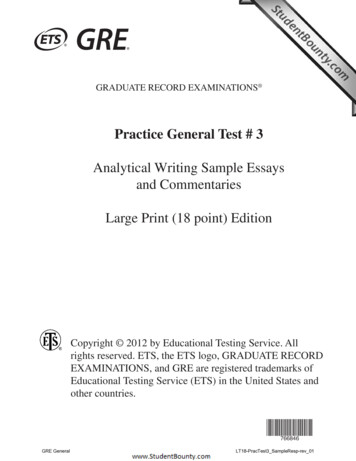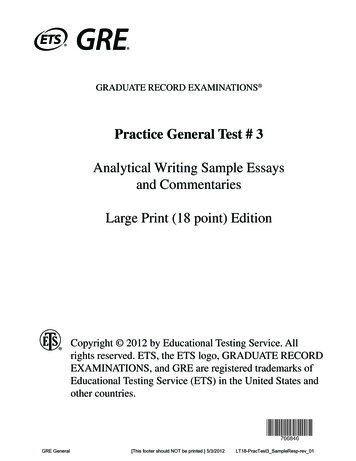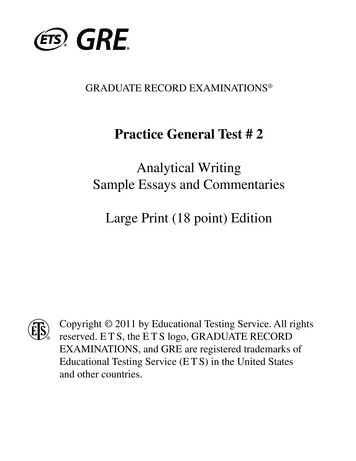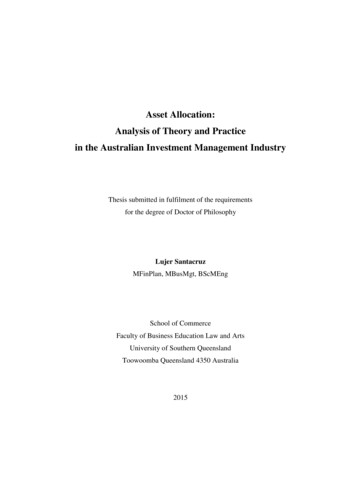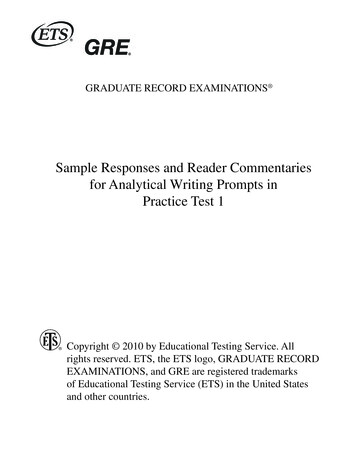
Transcription
GRADUATE RECORD EXAMINATIONS Sample Responses and Reader Commentariesfor Analytical Writing Prompts inPractice Test 1Copyright 2010 by Educational Testing Service. Allrights reserved. ETS, the ETS logo, GRADUATE RECORDEXAMINATIONS, and GRE are registered trademarksof Educational Testing Service (ETS) in the United Statesand other countries.
Revised GRE Practice Test 1Analytical Writing Sample Essayswith CommentariesThe Analytical Writing portion of the GRE consistsof two writing topics, an Issue topic and anArgument topic.Analyze an IssueSample Issue Topic DirectionsDirections: The Analytical Writing portion ofthe GRE consists of two writing topics: Analyzean Issue and Analyze an Argument. For thissection, Analyze an Issue will be the writing topic.You will be given a brief quotation that states orimplies an issue of general interest and specificinstructions on how to respond to that issue. Planand compose a response in which you developa position on the issue according to the specificinstructions. A response to any other issue will-2-
receive a score of zero. Standard timing foran issue topic is 30 minutes.Make sure that you respond to the specificinstructions and support your position on the issuewith reasons and examples drawn from such areasas your reading, experience, observations, and/oracademic studies.Trained GRE readers will read your response andevaluate its overall quality according to how wellyou do each of the following: Respond to the specific instructions on theissue Consider the complexities of the issue Organize, develop, and express your ideas Support your position with relevant reasonsand/or examples Control the elements of standard writtenEnglish-3-
Before you begin writing, you may want to thinkfor a few minutes about the issue and theinstructions and then plan your response. Be sureto develop your position fully and organize itcoherently, but leave time to reread what youhave written and make any revisions you thinkare necessary.Sample Issue Topic:The best ideas arise from a passionateinterest in commonplace things.Discuss the extent to which you agree or disagreewith the statement above and explain yourreasoning for the position you take. In developingand supporting your position, you should considerways in which the statement might or might nothold true and explain how those considerationsshape your position.-4-
The following are sample responses andcommentary on those responses, which explainhow the response was scored. There are responsesand scoring comments for essays with scores of 6,5, 4, 3, 2, and 1.Note: Sample responses are reproducedexactly as written, including misspellings, wrongchoice of words, typographical and grammaticalerrors, etc., if any.The following sample issue responsereceived a score of 6:Passion is clearly necessary for a truly greatidea to take hold among a people—passion eitheron the part of the original thinker, the audience,or ideally both. The claim that the most lucrativesubject matter for inspiring great ideas is“commonplace things” may seem initially to becounterintuitive. After all, aren’t great ideasusually marked by their extraordinary character?While this is true, their extraordinary character is-5-
as often as not directly derived from their insightinto things that had theretofore goneunquestioned. While great ideas certainly can arisethrough seemingly pure innovation. say, forexample, Big Bang cosmology, which developednearly all of its own scientific and philosophicalprecepts through its own process of formation,it is nevertheless equally true that suchgroundbreaking thought was, and is, still largelya reevaluation of previous assumptions to a radicaldegree. after all, the question of the ultimatenature of the universe, and man’s place in it,has been central to human thought since the dawnof time. Commonplace things are, additionally,necessary as material for the generation of“the best ideas” since certainly the success amongan audience must be considered in evaluating thesignificance and quality of an idea.The advent of Big Bang cosmology, whichoccured in rudimentary form almost immediatelyupon Edwin Hubble’s first observations at theHooker telescope in California during the early20th century, was the most significant advance-6-
in mankind’s understanding of the universe inover 400 years. The seemingly simple fact thateverything in the universe, on the very largescale, is moving away from everything else in factbetrays nearly all of our scientific knowledge ofthe origins and mechanics of the universe. Thisslight, one might even say commonplace,distortion of tint on a handful of photographicplates carried with it the greatest challengeto Man’s general, often religiously reinforced,conception of the nature of the world to an extentnot seen since the days of Galileo. Not evenCharles Darwin’s theory, though it created moreof a stir than Big Bang cosmology, had suchshattering implications for our conceptions ofthe nature of our reality. Yet it is not significantbecause it introduced the question of the natureof what lies beyond Man’s grasp. A tremendousnumber of megalithic ruins, including the Pyramidsboth of Mexico and Egypt, Stonehenge, and others,indicate that this question has been foremost onhumankind’s collective mind since timeimmemorial. Big Bang cosmology is so incredibly-7-
significant in this line of reasoning exactly becauseof the degree to which it changed the direction ofthis generally held, constantly pondered, and veryancient train of thought.Additionally, there is a diachronic significanceto the advent of Big Bang cosmology, which isthat, disregarding limitations such as the qualityof optical devices available and the state oftheoretical math, it could have happened at anypoint in time. That is to say, all evidence pointsto roughly the same raw intellectual capacity forhomo sapiens throughout our history, our progresshas merely depended upon the degree of it thata person happens to inherit, a pace that has beenincreasing rapidly since the industrial revolution.Yet this discovery had to happen at a certain pointin time or another—it cannot have been happeningconstantly or have never happened yet still bepresent—and this point in time does have its ownsignificance. That significance is precisely the factthat the aforementioned advent must haveoccurred at precisely the point in time at which ittruly could have occured—that is to say, it marks-8-
the point in our history when we had progressedsufficiently to begin examining, with remarkablesubstantiated acuity, the workings of the universeacross distances that would take millions of humanlifetimes to reach or to traverse. The point for thesuccess of this advent must necessarily have been,additionally, the point at which the audienceconcerned was capable and prepared to acceptsuch a radical line of reasoning.Both factors, a radical, passionateinterpretation of the commonplace and thepreparedness to accept such an interpretation,are necessary for the formulation of a truly greatidea. If the passion is absent from an inquiry bythe thinker or by the bulk of an audience, the ideawill die out if it comes to fruition at all. If thematerial is not sufficiently commonplace to beconsidered by an informed audience of sufficientsize, the same two hazards exist. Given thesetwo factors, the idea must still be found palatableand interesting by the audience if it is to hope togain a foothold and eventually establish itself ina significant fashion.-9-
Comments on sample essay receivingscore of 6:This outstanding response presents a cogent,well-articulated analysis of the complexities of theissue by arguing that (1) great ideas develop fromcommonplace observations that are interpreted ina radical way; and (2) passion is required of boththinkers and the audience in order for great ideasto take hold.The argument is based on an extendedexample (Big Bang cosmology) and has two parts.The first part defines “commonplace things” asuniversal questions (i.e., the quest to understandthe cosmos is commonplace, though complex,because it is an ancient and universal question)and places Big Bang cosmology in contextwith the scientific breakthroughs of Galileo andthe Pyramids of ancient Mexico and Egypt.The second part explains Big Bang as the resultof a convergence of factors: both thinkers andthe audience must be ready to reevaluate-10-
“previous assumptions” and accept “radical,passionate interpretations.”The argument’s careful line of reasoning isstrengthened by appropriate transitions betweenparagraphs (“Additionally,” “Both factors, a radical,passionate interpretation of the commonplace andthe preparedness to accept such an interpretation,are necessary for the formulation of a truly greatidea,” etc.) and within paragraphs (“Not evenCharles Darwin’s,” “Yet,” “that is to say,” etc.).Fluent and precise language—advent, rudimentary,diachronic, shattering implications, megalithicruins—and effective sentence variety alsocharacterize this response as outstanding. Finally,despite the presence of minor errors (overuse ofcomma and inconsistent use of ellipses inparagraph 1), this response demonstrates facilitywith the conventions of standard written English.-11-
The following sample issue responsereceived a score of 5:The statement above comes from theperspective that the best thinkers, inventors, andinnovators are the way that they are because theyexplore passionately the interesting things aroundthem. Yes, I would say that this is definitely true.I understand best the things that interest me, butit is only the things with which I am familiar withand understand in my surroundings. It would bedifficult to take passionate interest in the thingswhich I did not have available in my environment.For example, let’s consider some “idea” peoplein history. The person who invented the basketballhoop, or the game of volleyball, or ice skates, allhad interest in those things before they had theirbrilliant ideas. I do know that the inventor of thebasketball hoop used to coach a basketball teamof young boys, and they would throw the ballinto a fruit basket that was nailed to the wall.Obviously, a basket has a bottom to it, and theywould have to fish it out after every successful-12-
throw. So he had the brilliant idea of cutting outthe bottom of the basket. It seems so simple to usnow, but nobody had ever played basketball likethat in his day.The phrase, “commonplace things” can berather misleading, I believe. I think every personhas slightly different “commonplace things” in theirenvironment depending on their interests, theirfinancial status, and availability of items. What iscommonplace for one person may never be knownby another. I take passionate interest in thingshaving to do with sewing using patterns, fabricsand threads. However, my mother andgrandmother are excellent seamstresses andI had the availability of learning from them. It wasa “commonplace thing” for me. I have had somewonderful ideas come out of my passion for thiskind of art.Orville and Wilbur Wright had a passionateinterest in things having to do with flight, a ratherordinary thing for the sorts of birds who can flywith their wings, but certainly not people. If I hadlived during the Wright brothers’ time, I would-13-
probably not have had the same passionateinterest in figuring out how to make humans fly,because it is not something that I would havethought possible. But their dreams and visionarypossibilities were much bigger than mine wouldhave been at that time. They not only had apassionate interest but they were willing toexperiment, to risk financial ruin and ridicule,and even put their lives on the line. So while it istrue that the best ideas arise from a passionateinterest in commplace things, there also has to bean element of daring to challenge “norms” and notbeing able to just accept things as they are. Therehas to be a desire to make things better and toimprove on the present.There also has to be the element of not beingafraid of failure. Most ideas do inevitably fail.Einstein is viewed today as being one of the mostbrilliant thinkers and “idea” people in all of history.But nobody really talks about how many times hisideas failed. The number is quite amazing. Manypeople are afraid of failure, so even though theymake take a passionate interest in something-14-
commonplace, and have some great ideas,they may never carry them through because ofuncertainty that they would work. We must bewilling to try!So, yes, it is true that the best ideas arisefrom a passionate interest in commonplace things,because these are the things that we know, theseare the things that we understand, and the thingsthat we want to explore in even more depths. Butthere must be more elements involved than justtaking interest in something. We must be willingto face risks of many kinds in order to separate theideas that fail from the ones that will triumphantlysucceed.Comments on sample essay receivingscore of 5:This strong response presents a wellconsidered analysis of the complexities of the issueby arguing that great ideas come, not only froma passionate interest in the commonplace, but alsofrom great imagination and a willingness tosucceed.-15-
The logic of the response unfolds verysmoothly: paragraph 3 explores the term“commonplace” and offers support for the prompt’sposition; paragraphs 4 and 5 discuss the relatedissues of imagination, willingness to experiment,and overcoming failure. The examples are wellchosen and generally well developed.Paragraph 2 offers a relevant, thoughpredictable, sports example (invention ofbasketball hoop) to examine how commonplacethings/familiarity can spark great ideas. A personalexample is used in paragraph 3 to further explorethe definition of “commonplace” and illustratehow the term is relative to financial status andavailability (though only the concept of availabilityis developed in this example). Paragraph 2logically extends into paragraph 3, and the sameconnection is seen between paragraphs 4 and 5.In paragraph 4 the Wright brothers are used toargue that great ideas also come from imaginationand a willingness to experiment. The finalexample, in which Einstein is offered to illustratethe necessity of overcoming failure, is not as fully-16-
developed as the others. The respondent does notexplain what failures Einstein endured or how heovercame them, which makes the example lesscompelling. Overall, the analysis demonstratedin the examples is “perceptive and clear,” but not“insightful and cogent” as required for a score of 6.While the response expresses ideas clearly,using appropriate vocabulary and sentence variety,it does not use language as fluently and preciselyas would a typical 6. Occasional wordiness/awkwardness could be avoided with more precisediction (e.g., “There also has to be the element ofnot being afraid of failure,” or “I have had somewonderful ideas come out of my passion for thiskind of art”).The following sample issue responsereceived a score of 4:In agreement with the statement, many greatinventions have come from individuals interestedin commonplace things. Out of simplicity arisesgreat ideas, and I would consider commonplacethings to be simplistic. However, it is hard to say-17-
that the “best” ideas arise from passion incommonplace things, because one could arguethat the best ideas involve interest in remarkablethings, which is what makes them the “best” ideas.If the statement is viewed from the standpointof all ideas from the beginning of civilization,then the statement holds true. Examples ofcommonplace things are food and shelter. Ifa person had an abundance of food and neededto transport it, they may have the idea to weavea basket or make some sort of tote in order toload more at once. With that idea, eventuallythe people would think of things to make thefirst idea more useful, such as adding wheels toyour carrying device. With shelter, first people(Cro-Magnon)may have kept out of weather andunsafe territory by using caves as shelter. Frompassionate interest in the common shelter a personmay have come up with brilliant ideas aboutstructures, architecture, and construction.In concern with the opposing view that thebest ideas arise from remarkable things, one couldargue that best ideas are medical breakthroughs-18-
and all other aspects of Science. Working withsubstances and molecules and creating ions andisotopes is not a commonplace thing. However,it is what the people who make the scientificbreakthroughs have passionate interest inexpanding.Looking at the big picture, I would say thatif people did not have “passionate interest incommonplace things”, then the idea that led us tothe remarkable things would have never occurred.If that is true then the statement holds truebecause the best ideas do arise from a passionateinterest in commonplace things. Though someolder ideas may seem obsolete now, there wasa time that without those ideas, we would stillbe in the dark ages.Overall, I agree with the statement. The bestideas do arise from a passionate interest incommonplace things. Though I do not considermedical breakthroughs coming from interest incommonplace things, our species appears to bereaching the point in which cancer and AIDS couldbe considered a commonplace thing. If that is true,-19-
then when someone finds a cure for cancer orAIDS it will be one of the best ideas arising froma passionate interest in a commonplace thing.Once again reinforcing the truth of the statement.Comments on sample essay receivingscore of 4:This response presents a competent analysisand conveys meaning adequately.Paragraph 2 offers appropriate and adequatelydeveloped examples from “the beginning ofcivilization” to illustrate how commonplace needsinspire innovation: the need to transport food ledto the invention of woven baskets and, eventually,the invention of the wheel; similarly, the needfor shelter that drove “Cro-Magnon” to the caveseventually inspired “brilliant ideas aboutstructures, architecture, and construction.”Paragraph 3, which explores the “opposingview” (the best ideas arise from remarkablethings), is less developed. The respondent claimsthat the best ideas are “medical breakthroughs andall other aspects of Science,” without explaining-20-
what is meant by “Science” or why these typesof ideas are the “best.” Does “Science” includeengineering, computer sciences, and the socialsciences? Why are advances in science andmedicine better than advances in religion,the arts, or philosophy? The response also failsto acknowledge the commonplace interests(e.g., desire to improve quality of life) that drivemedical/scientific research. While the responseaddresses two sides of the issue, it never delvesinto complexity the way a 5 or 6 would.In paragraph 4, the response comes to a newconclusion: without initial interest in commonplacethings, interest in remarkable things would beimpossible. This is an interesting position that,if developed and supported with well-chosenexamples, could lead to complex analysis.However, the conclusion is merely stated, looselysupported with generalities, and then furtherconfounded by shaky logic in paragraph 5.Ideas are expressed with reasonable clarityand the response generally demonstrates controlof language. It is lack of complexity and logical-21-
development that keep this response from earninga higher score.The following sample issue responsereceived a score of 3:How do new knowledge came into being?Sometimes it stemed from exsiting knowledge.Sometimes it was born all out of sudden. Bothways seem work well. As I see through thisquestion, I believe that what plays a key rolein creating new ideas is a passionate interest.Throughout history, a myriad of exampleshelp prove the importance of interest. Edison,the greatest inventors in the world, posesseda sharp interest ever since his childhood. In hiseyes, every common things were full of mysteries.It was his unique interest which helped him lookinto the machanism of things around thereforenew iders came into his mind and, changed intoconceret machines facilitating our lives. Anotherfamous example is that of Newton. A riped applefrom a tree fell onto his head one afternoon. For-22-
ordinary people, this kind of trivial instance wouldslip off their mind at once. However, Newton losthisself in thought of the relation between objects.Finally he found gravitation and opened up a newera of physics.On the other hand, without interest, theopportunity of great discoveries will pass by. Mostpeople are experiencing ordinary lives everyday.Why don’t they come up with great ideas? Becauseinterest is a state of skeptism, a state in which wedo not stop to disclose the truth beneath a surfaceof commonplaces. Interest means the ability toexplore the internal corelations. Therefore, witha passiontae interest, those commonplace thingsare no longer commonplace, and new ideas arecreated.From what have been discussed above, wecan see that interest serves as force to propell theexploration of unknowns, to perfect the structureof human knowledge, and to move towards theultimate truth.-23-
Comments on sample essay receivingscore of 3:This limited response demonstrates somecompetence in its analysis and in conveyingmeaning but is obviously flawed.The response agrees with the prompt byarguing that a passionate interest allows peopleto see beyond the commonplace and createnew ideas (paragraphs 1 and 3). However, theresponse is limited in presenting and developingthis position.In paragraph 2 the response offers tworelevant but underdeveloped examples to illustratethe importance of interest in generating ideas.The Edison example is not persuasive because itsdevelopment is limited to generalities (“commonthings were full of mysteries.which helped himlook into the machanism of things.thereforenew iders came into his mind and, changed intoconceret machines”). The response does notprovide specific examples of the common “things”that interested Edison nor does it discuss any of-24-
Edison’s particular ideas. Thus, it does little toadvance the response’s position. The Newtonexample is not penalized for historical inaccuracy.However, like the previous example, it is overlygeneral and underdeveloped.The response also contains an accumulationof language errors (in usage, word choice, andsentence structure) that often result in a lack ofclarity. For instance, the rhetorical device usedin paragraph 1 contains frequent errors thatrender it ineffective. The imprecise language usein the Newton example is particularly unsettling:“Newton lost hisself in thought of the relationbetween objects. Finally he found gravitationand opened up a new era of physics.” Whilethese errors do not generally interfere withmeaning, they constitute a lack of languagecontrol that precludes a score of 4.-25-
The following sample issue responsereceived a score of 2:The above statement reinforces my valuesand beliefs. I agree that the best ideas arises froma paasionate interest. I agree simply becausea person must be able to personally relate toa thing in order to become passionate to the idea.The person behind the best ideas are passionatebecause the commonplace things have affectedthe person on a personally level or on a mutuallevel. The relationship between the commonplacething and the best idea unites a passionate interestto the person who it has affected. A person musthave a desire to build on their passion in orderto follow through on his or her idea.Comments on sample essay receivingscore of 2:This response presents a seriously flawedanalysis of the issue.The response agrees with the prompt byarguing that a person must be able to relateto something in order to develop passion for it.-26-
(The connection between things one can “relate to”and “commonplace things” is implied.) Theresponse also states that passion is necessaryin order for a person to follow through on an idea.However, neither of these claims is supported withrelevant reasons or examples.Furthermore, flawed word choice and otherlanguage control problems make the reasoninghard to follow (particularly in sentences 4 and 5:“The person behind the best ideas are passionatebecause the commonplace things have affectedthe person on a personally level or on a mutuallevel. The relationship between the commonplacething and the best idea unites a passionate interestto the person who it has affected.” In thosesentences the respondent attempts to analyzethe relationship between commonplace things,passion, and ideas). Nevertheless, this responseis not a 1: the respondent does provide evidenceof the ability to understand the issue and attemptsto present a position on it.-27-
The following sample issue responsereceived a score of 1:This topic can be found to be true in manydifferent areas. The best ideas that people havecome up with are usually founded be improvingcommonplace things. For example in order toimprove the effiecency of writing the typewriterwas invented, then following that the computerwas invented.Comments on sample essay receivingscore of 1:This response presents a fundamentallydeficient discussion of the issue.The first sentence consists of generic languagethat can be applied to any prompt. Thus, it neitherenhances nor detracts from the analysis. Theremainder of the response consists of a statementin support of the prompt and a list of two examples(the typewriter and the computer). The examplesoffered are potentially relevant but completelyundeveloped. Basic errors in usage and grammar-28-
are pervasive, but it is primarily the inabilityto develop an organized response that makesthis response a 1.This is the end of sample responses andcommentaries for the Issue task. Sampleresponses and commentaries for the Argumenttask follow.-29-
Revised GRE Practice Test 1.Analyze an ArgumentSample Argument Topic DirectionsDirections: The Analytical Writing portion of theGRE consists of two writing topics: Analyze anIssue and Analyze an Argument. For this section,Analyze an Argument will be the writing topic.You will be given a short passage that presentsan argument, and specific instructions on howto respond to that passage. Plan and composea response in which you analyze the passageaccording to the specific instructions. A responseto any other argument will receive a score ofzero. Standard timing for an argument topic is30 minutes.Note that you are NOT being asked to presentyour own views on the subject. Make surethat you respond to the specific instructions and-30-
support your analysis with relevant reasons and/orexamples.Trained GRE readers will read your analysis andevaluate its overall quality according to how wellyou do each of the following: Respond to the specific instructions onthe passage Identify and analyze important featuresof the passage Organize, develop, and express your analysis Support your analysis with relevant reasonsand/or examples Control the elements of standard writtenEnglishBefore you begin writing, you may want to thinkfor a few minutes about the passage and theinstructions and then plan your response. Be sureto develop your analysis fully and organize itcoherently, but leave time to reread what youhave written and make any revisions you thinkare necessary.-31-
Sample Argument Topic:The argument to be analyzed is as follows:Hospital statistics regarding people who go tothe emergency room after roller-skating accidentsindicate the need for more protective equipment.Within that group of people, 75 percent of thosewho had accidents in streets or parking lots hadnot been wearing any protective clothing (helmets,knee pads, etc.) or any light-reflecting material(clip-on lights, glow-in-the-dark wrist pads, etc.).Clearly, the statistics indicate that by investingin high-quality protective gear and reflectiveequipment, roller skaters will greatly reduce theirrisk of being severely injured in an accident.Write a response in which you examine the unstated assumptions ofthe argument aboveand explain how the argument depends onthe assumptions and what the implicationsare if the assumptions prove unwarranted.-32-
The following are sample responses andcommentary on those responses, which explainhow the response was scored. There are responsesand scoring comments for essays with scores of 6,5, 4, 3, 2, and 1.Note: Sample responses are reproducedexactly as written, including misspellings, wrongchoice of words, typographical and grammaticalerrors, etc., if any.The following sample argument responsereceived a score of 6:The argument above is well-presented andappears to be relatively sound at first glance:because of the hospital statistics regarding peoplewho go to the emergency room after roller-skatingaccidents, the roller skaters should investing inhigh-quality protective gear and reflectiveequipment in order to reduce their risk of beingseverely injured in an accident. However, as morelight is shed on the issue and more detailed factsare concerned, it is easy to see that the argument-33-
suffers from several grave fallacies in itsassumptions as well as commits a false analogy.To begin with, as mentioned in the argument,there are two distinct kinds of gear—preventativegear, such as light reflecting material, andprotective gear, such as helmets. Preventativegear is intended to warn others, presumably forthe most part motorists, of the presence of theroller skater. It works only if the “other” is aresponsible and caring individual who will affordthe skater the necessary space and attention.Protective gear is intended to reduce the effect ofany accident, whether it is caused by another, theskater or some force of nature. Protective geardoes little, if anything, to prevent accidents but ispresumed to reduce the injuries that occur in anaccident. The statistics on injuries suffered byskaters woul
Analyze an Issue Sample Issue Topic Directions Directions: The Analytical Writing portion of the GRE consists of two writing topics: Analyze an Issue and Analyze an Argument. For this section, Analyze an Issue will be the writing topic. You will be given a brief quotation that states or implies an issue of general interest and specific
